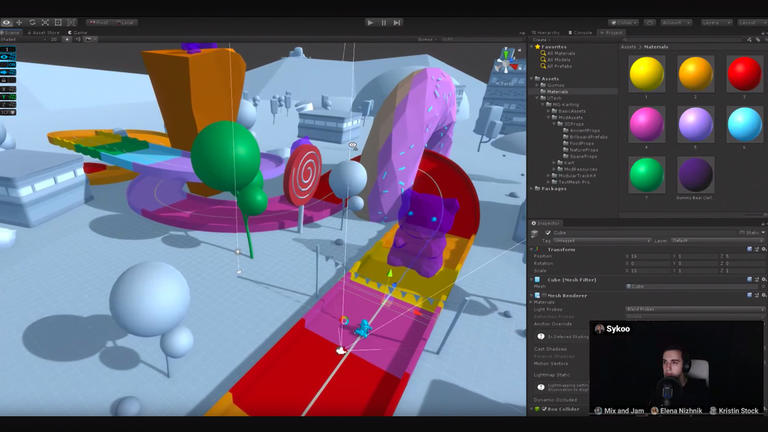
Yesterday, Unity – maker of a popular game development engine – introduced plans to “introduce a new Unity Runtime Fee that’s based on game installs”. The response from game developers was swift and excoriating, with many game-makers posting furious reactions on social media.
In a blog post, Unity declared that the fee will apply to all developers who pass a certain success threshold. Those who use the lower end Unity Personal and Unity Plus will begin paying the fee when they pass $200,000 in earnings for a game in a year, and have at least 200,000 lifetime game installs. Developers who use the higher-end Unity Pro and Unity Enterprise will pay when they pass sales of $1,000,000 USD over a year, and have at least 1,000,000 lifetime game installs.
The company claimed that this step “allows creators to keep the ongoing financial gains from player engagement, unlike a revenue share”. While it seems clear that Unity’s step targets the most lucrative and successful games built on its platform, developers have been quick to point out serious flaws in the plan that could have a detrimental effect on all game creators.
They also note that the fee is effectively retrospective, as it includes any game that continues to be available on the market after January 1, 2024, including those that have already been released.
Developer Aggro Crab released a statement that has so far been shared more than 17,000 times. It pointed out the enormous cost for game developers whose games are used on subscription services like Xbox Game Pass.
“This decision puts us and countless other studios in a position where we might not be able to justify using Unity for our future titles. If these changes aren’t rolled back, we’ll be heavily considering abandoning our wealth of unity expertise we’ve accumulated over the years and starting from scratch in a new engine, which is really something we’d rather not do.”
Like the plague
Tom Francis, the designer of Gunpoint, tweeted that Unity is “rug-pulling a new fee structure on devs” that is “an astonishing scumbag move”, adding that “a partner who can and will change how much of your revenue you owe them after you’ve made and released your game needs to be avoided like the plague”.
Last year, Unity Unity celebrated record revenues of $1.39 billion, as well as a profitable fourth quarter. But back in May, the company announced a third round of lay-offs in less than a year, affecting around 600 workers. The company has also shut around 30 offices around the world.
Unity says that every install carries the charge, including those who install on multiple devices, or who reinstall a game. Noted game developer Rami Ismail posted a note that demos, DRM-free games, bundles, giveaways, updates, and multi-device users are “now a risk to devs”. He said that “there is no way Unity talked to a single developer before launching this”.
(UPDATE: Subsequently, Unity sought to clarify some of the charges detailed, saying that Game Pass, demos, and reinstalls will mostly be exempt.)
Garry Newman, developer of the popular Garry’s Mod, wrote that the new charges means that “lifetime we’d have paid them about $410k more. About $40k a year.” He added a series of pertinent questions: “Unity can just start charging us a tax per install? They can do this unilaterally? They can charge whatever they want? They can add install tracking to our game? We have to trust their tracking?”
Responding to a query on Twitter about how exactly the company is counting and registering game installs, Unity replied that it will “leverage our own proprietary data model,” but declined to offer any further details. Brandon Sheffield, director at Necrosoft Games, responded that “they can just tell you how much they THINK you owe them”.
Fundamental change
In a subsequent blog post, Sheffield wrote that, although he was once an admirer of Unity, he can no longer recommend the engine to fellow developers. “I can say, unequivocally, if you’re starting a new game project, do not use Unity. If you started a project four months ago, it’s worth switching to something else. Unity is quite simply not a company to be trusted.”
Tomas Sala, developer of Falconeer, posted: “I already committed to their engine for my new game. Put years and years of work into my pipeline. I did so under a simple per seat license I am happy to pay. Now while I am close to release they spring something new on me. Not a price increase – a fundamental change in how we do business together. I have no options, cannot go back, can only bend and pay up. It’s [a] form of blackmail…It is gross and It makes me want to go somewhere else with my business.”
Mike Bithell, developer of a string of hits, including Thomas Was Alone, described Unity (the company) as a “strange jumble of people just discovering the videogame industry for the first time”. Daniel Helbig, a developer with Megagon Industries, wrote: “How can a game company be so out of touch with the current market situation?”
Ash Parrish, a reporter for The Verge, deftly pointed out a major flaw in Unity’s plan, describing it as “a new extremely hellish way for chuds to register their displeasure when a game dev dares to add a woman or a poc to a game: revenue bombing”.
Alex Strook, developer of Spirit and Mouse, pithily summed up the collective outrage: “I dont think Ive ever seen so many devs angry against the same thing. This is true Unity.”
Colin Campbell has been reporting on the gaming industry for more than three decades, including for Polygon, IGN, The Guardian, Next Generation, and The Economist.
 GameDaily.biz © 2026 | All Rights Reserved.
GameDaily.biz © 2026 | All Rights Reserved.